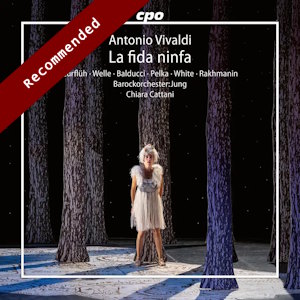
Antonio Vivaldi (1678-1741)
La fida ninfa, RV714 Music drama in Three Acts (1732)
Oralto – Yevhen Rakhmanin (Bass)
Morasto – Vojtěch Pelka (counter-tenor)
Osmino – Nicolò Balducci (counter-tenor)
Licori – Chelsea Zurflüh (soprano)
Elpina – Elieen Welle (mezzo)
Narete – Kieren White (tenor)
Barockorchester: Jung/Chiara Catani
rec. live, 11-19 August, 2023; Haus der Musik-Kammerspiele; Innsbruck, Austria
Booklet contains Italian libretto with English translation
cpo 555646-2 [2 CDs: 128]
This is the second recording of Vivaldi’s 1732 opera La fida ninfa to appear on disc. The first was on the Naïve label as part of their Complete Vivaldi edition and presumably used the score as it was performed at its premiere performance, which inaugurated a new opera house in Verona , the Nuovo Teatro Filharmonico. This new recording from CPO proudly announces on the back cover that it uses the score for Turin (also from 1732) in its first version. Does this mean that there exists more than a single version for Turin? Unfortunately the otherwise excellent booklet notes don’t mention anything about the Turin score or the differences it might have from the Verona version. CPO has a history of not being thorough in their booklet notes and this booklet continues with that tradition.
One difference that immediately emerges between the two recordings is that they both utilize different overtures, as the one for La fida ninfa has either been lost or was never an original composition, but might have been some music that had been recycled from elsewhere. On Naïve, Jean Christophe Spinosi reuses the overture from Vivaldi’s L’Olympiade RV725, while Chiara Catani on this one makes do with one of Vivaldi’s Concerti in F major, although precisely which one has not been identified. These two contrasting openings seem to epitomize just how different the experience of hearing these two recordings is. On Naïve Spinosi uses a cast of star baroque specialist singers and the conductor takes a hyper-precise approach to the music. It is dramatic and cleanly articulated but often has very fast tempi. Overall it leaves an impression of aggressiveness which is not in tune with the gentle pastoral nature of the story. On CPO Catani takes a similarly well-articulated approach. Her tempi are neither fierce nor rushed, while her more relaxed approach to Vivaldi’s score allows it to breathe more naturally. This performance emerges with a real sense of charm which is perhaps what Vivaldi was trying to get at in composing this work. The musicians of the Barockorchester: Jung are entirely in sympathy with Catani’s approach to the score; their playing is just delightful.
The plot of this opera concerns two brothers who have been marooned on an island since childhood and have become both mixed-up in their identities and lost to one another. There are elements to this story which seem to derive inspiration from Shakepeare’s The Tempest.
The roster of singers doesn’t contain the star power of the Naïve recording but they all give excellent accounts of the roles in this gentle comedy. Rakhmanin’s light weight bass suggests a career in buffo roles. If his voice doesn’t roll out as voluminously as some other basses, he compensates with the fleetness and accuracy of his singing in the coloratura passages. Kieren White’s Narete has a sweet tenor sound but he too is rather on the light side of voices. He certainly sounds far too young to be anyone in this cast’s father.
Vojtěch Pelka makes an impressive debut on disc as one of a pair of brothers, Morasto. His countertenor fits easily into the soprano range and is sweet sounding throughout all registers. He has the makings of being a future star among the counter-tenor ranks. Nicolò Balducci sings his music very stylishly as the second brother. His is a counter-tenor voice is more in common with what one usually encounters today (a slightly edgy sound that falls into the mezzo range). He sings his music very stylishly.
Among the nymphs present on the island Chelsea Zurflüh’s Licori offers a superbly expressive lyric soprano with an excellent command of the text. Elieen Welle’s fine lyric mezzo makes an attractive and spirited Elpina.
The performance has been recorded live on stage at the Innnsbruck Early Music Festival. The sound is excellently detailed with a touch of theatrical atmosphere. At no time could I sense the presence of an audience. The recitatives have real life to them and the continuo contribution has both drive and impact that is really rewarding to hear. On the whole I find that the charm of this new recording outweighs any minor flaws stemming from the fact that it was recorded live on stage. While those who have already purchased the Spinosi version on Naïve don’t necessarily have to rush out to acquire the cpo version, it will be this one that I will be pulling off my shelf whenever I want to experience Vivaldi’ s enchanting bucolic opera.
Mike Parr
Buying this recording via a link below generates revenue for MWI, which helps the site remain free




















